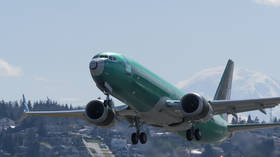Missing safety alarm on crashed 737 MAX was ‘not necessary,’ FAA didn’t need to know, Boeing claims

Boeing has claimed that a safety warning light packaged as an optional extra on the 737 MAX 8 was not “necessary for safe operation,” even after the light’s absence had been blamed for two fatal crashes.
Boeing’s 737 MAX 8 has been involved in two deadly crashes in less than six months, killing a combined 346 people. In both cases, investigators have blamed incorrect ‘angle of attack’ (AOA) sensor data for pitching the planes downwards to their doom. A functioning warning light could have alerted pilots to this malfunction.
While Boeing shipped the aircraft with a light fitted as standard, it would not work unless airlines had opted to buy a separate AOA indicator, the company revealed in a statement on Sunday.
Also on rt.com Warren Buffett would ‘never hesitate’ to fly on Boeing 737 MAX – even after fatal crashesBoeing engineers discovered this problem in 2017, but conducted an internal review and concluded that the dummy alarm “did not adversely impact airplane safety or operation.” Only after the crash of Indonesian Lion Air Flight 610 last November did the company issue a bulletin revealing that the light did not work as advertised.
Following the Lion Air disaster, the Seattle-based company told the Federal Aviation Administration (FAA) that it had identified the problem a year previously, but insisted that its own review was correct, and that the light did not have any impact on the safe operation of the airplane.
Boeing stuck to this line on Sunday, claiming that “on every airplane delivered to our customers, including the MAX, all flight data and information needed to safely operate the aircraft is provided in the flight deck on the primary flight deck displays.”
While pilots were aware of the usual safety gear and readouts, they were unaware of the plane’s Maneuvering Characteristics Augmentation System. This system automatically pitched the plane downwards to prevent stalls, an unfortunate byproduct of the 737 MAX’s aerodynamic design and high-mounted engines. Investigators in both crashes linked the planes’ sudden nosedives to the over-aggressive corrections of the MCAS system. Had pilots been alerted to the change in pitch by a functioning AOA alarm, the accidents may have been averted.
We at Boeing are sorry for the lives lost in the recent 737 accidents and are relentlessly focused on safety to ensure tragedies like this never happen again. Watch the full video here: https://t.co/kZawq35YnZpic.twitter.com/G9uIHjxsWi
— Dennis A. Muilenburg (@BoeingCEO) April 4, 2019
Likely fearing litigation, Boeing has found itself in a curious bind in recent weeks. Company CEO Dennis Muilenburg has apologized for the loss of life, and admitted that a “chain of events” led up to the accidents, rather than “any single item.” At the same time, the company is currently working on a software update to tame the over-eager MCAS system.
Likewise, while Boeing stood by its claim that an AOA warning light has “never been considered a safety feature,” the company also promised to fit a functioning light as standard from now on, as well as a standalone AOA indicator. A software update will also give airlines the ability to activate the light on previously delivered planes.
Also on rt.com Boeing withdraws 2019 financial forecast & pauses share buybacks amid mounting concerns over 737 MAXThe 737 MAX 8 remains grounded worldwide. The FAA will need to approve Boeing’s software updates before the troubled jet can return to the skies, but the certification process that led to the plane being green-lighted is also being examined by federal prosecutors, the Transportation Department’s inspector general, and a department panel.
Boeing’s loss looks set to be Airbus’s gain. Emirati state-owned airline Flydubai is currently negotiating potential purchases of new A320 Neo jets from the European conglomerate, in a bid to replace its fleet of 737 MAXs. Flydubai was due to take delivery of 250 737 MAX aircraft by 2030.
Think your friends would be interested? Share this story!














